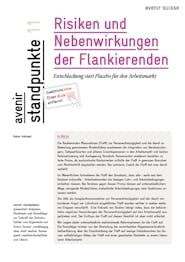Accompanying measures (AM) were put in place in 2004, as a political compensation after Switzerland agreed to the Free Movement of Persons with the EU. Since then, AM have been expanded seven times, continuously restricting the liberal and flexible labor market, one of the country’s strongest assets. The initial objective of the AM was to protect domestic workers from excessive negative pressure on wages and working conditions, supposedly brought by the entrance of new foreign newcomers on the labor market. Free Movement of Persons has not had global negative consequences for Switzerland and its labor market, quite the contrary. AM have not demonstrated their efficiency. Worst, they miss their initial objective, by protecting the “insiders” (those who already have a job) and disadvantaging “outsiders” (those who try to enter, or re-enter, the labor market). Avenir Suisse proposes to gradually reduce the volume of AM. Moreover, AM should focus only on economic sectors in which severe distortions on the labor market are factually assessed.
Switzerland is not a member of the EU, but the level and density of exchanges and interactions with the EU is very high. This has led to the signing of the “Bilateral Agreements” between Switzerland and the EU, which include the principle of Free Movement of Persons. Since then, every national citizen of an EU state has the right to establish him- or herself in Switzerland if he or she has a work contract with a Swiss employer; companies based in EU member states also gained the right to post (detach) workers in Switzerland for a maximal 90 day period. Reciprocity is of course guaranteed and Swiss citizens have the right to work in EU member states.
Politically, the signing of the Free Movement of Persons agreement generated concerns regarding the domestic labor market. It was (and still is) especially feared that the entry of foreign newcomers into the labor market, with allegedly lower wages, would lead to the increase of negative pressure on domestic workers; either on the jobs themselves or on the general level of remuneration. Hence, a catalog of Accompanying Measures (abbreviated form “AM”) was put in place in 2004, as a political compensation for the Free Movement of Persons. Since then these AM have constantly been strengthened, but always tending towards additional restrictions of a free labor market.
Concretely, AM consist of three categories:
- Facilitation for the extension of Collective Employment Contracts (CEC). An extended CEC becomes “generally applicable”, which means that all the employers and workers of an economic sector have to comply with the rules of the extended CEC, especially those concerning minimal wages. The extension is “facilitated” towards an ordinary one, in the sense that only one condition is required (submission of a majority of workers to the CEC before its extension). Unions and Employers’ Organizations
- Creation of Standard Employment Contracts (SEC), in the absence of Collective Employment Contracts. SECs are contracts whereby clauses governing the formation, nature, and termination of certain types of employment relationship are laid down and become mandatory for an economic sector. Minimal wages are at the core of the SECs.
- Mandatory rules (especially minimal wages) for workers posted (detached) in Switzerland by their foreign employer.
The control and application of the AM are shared between Employer’s Organizations, Unions and the State.
In its latest publication, Avenir Suisse assesses the situation after more than a decade of existence for Free Movement of Persons and Accompanying Measures. In short:
- Free Movement of Persons has not induced globally negative consequences on the Swiss labor market. The unemployment rate has remained low, and the global activity rate high.
- The additional workforces coming from the EU have, in large majority, consisted of persons with high skills, which were not available on the domestic market.
- Free Movement of Persons has not induced a negative evolution on the global remuneration level in Switzerland, on the contrary. However, not all categories of workers have benefitted in the same way. The progression for domestic high-skill workers or foreign low-skill workers has been slower than the one for mid-qualified domestic workers.
- AM have not demonstrated their concrete contribution to the relatively good situation of the Swiss labor market. Contrary to the main initial objective, which was to protect domestic workers from an exaggerated pressure on the wage-level, the AM are now protecting mainly the “insiders” (persons having already a job) and tend to create higher thresholds for the “outsiders” trying to enter (or re-enter) the labor market, such as newcomers, persons re-qualifying in other economic sectors or senior workers.
This “cartelization” of the labor market is contrary to the Swiss tradition of a liberal and flexible labor market; one of the key success factors of the country in the last decades. This competitive advantage must absolutely be maintained. The constant additional restrictions induced by new AM are detrimental to this cardinal principle. Eventually, they lead to trumped labor domestic costs and poorer work productivity. This undermines the competitiveness of the Swiss domestic job market and is an additional incentive to automation and delocalization.
Avenir Suisse suggests that AM should remain what they are called: temporary measures (and not definitive ones). AM should be reduced over time, not extended. Decisions regarding AM should be based on factual and economic factors, not political ones, and permitted only to sectors in which a gross distortion is noted in the labor market; for instance, a strong increase in unemployment, a downward spiral of real wages or an increasing gap between the (low) remuneration of new entrants and the (higher) one of senior workers.





